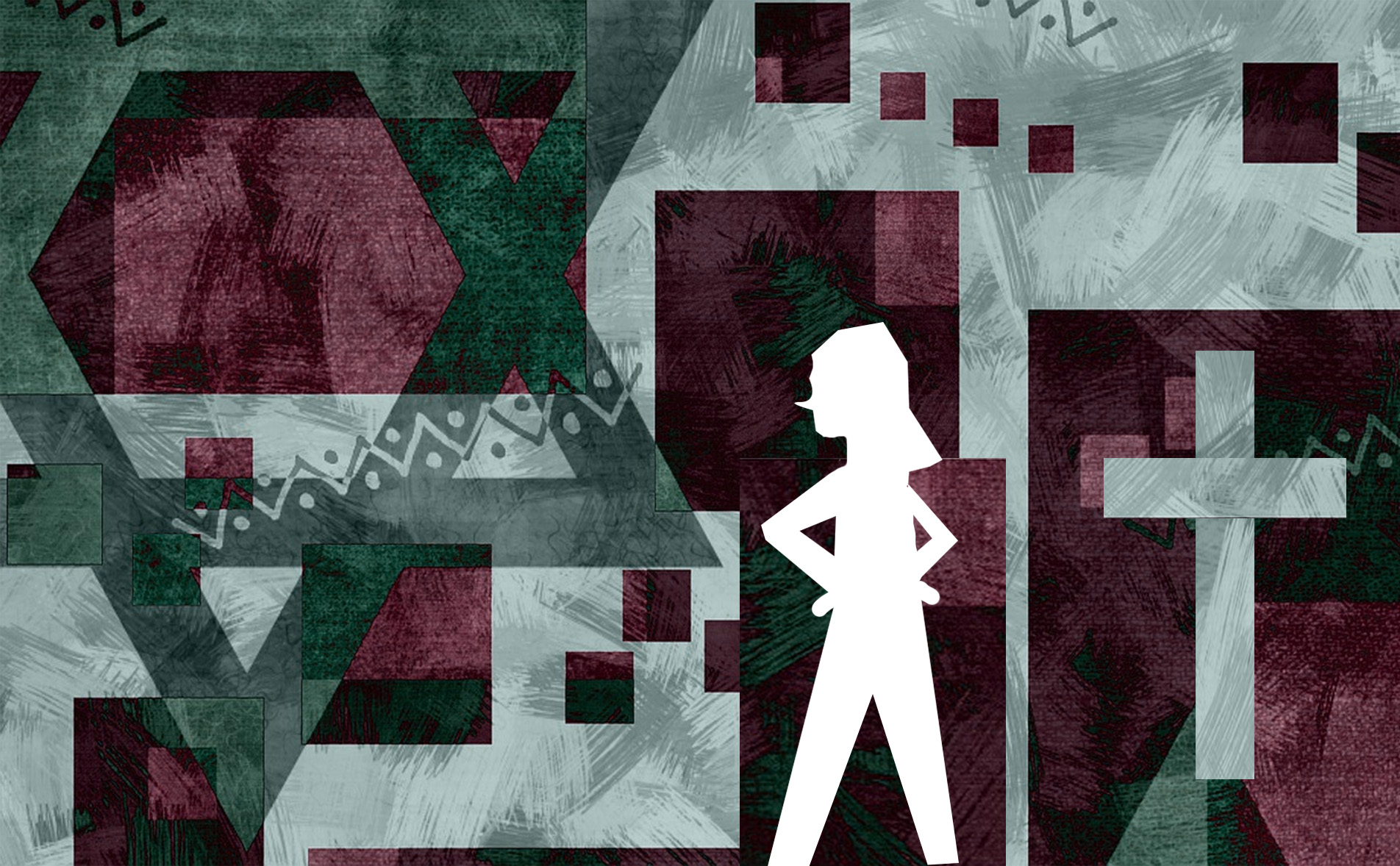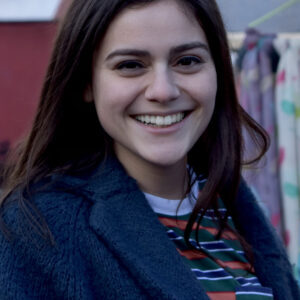With an evidently-Italian last name, my Jewish identity starts out as a puzzle to my peers and quickly becomes something for them to solve; my Jewishness and my Christianity pitted against each other like they were two separate choices to make. In elementary school, my peers called me Jewish on Hanukkah and Christian on Christmas Day, assuming this identity switch maximized gift potential. When I got older and the amount of gifts I was estimated to receive in the month of December no longer determined my social status, my peers just decided I was “Jew-ish” emphasizing the second syllable lazily, with a grin and a shrug.
For a while, I accepted Jew-ish as a self-descriptor, though I would never call myself this. I only let others say it and I would nod, slowly. I’d never thought it was my job to choose a side, and perhaps this refusal was the first indication that this term was only a conduit of self-doubt. The first syllable gave me a sense of connection to Judaism, something I believed growing up that I was part of, but the second syllable left me hesitant; perhaps a multi-faith person like myself had no business calling herself Jewish if that was only half of her. Because I could not ascertain what amount of Jewishness I was allowed and I constantly heard the enunciation of Jew-ish echoing back to me, I was left with uncertainty and curiosity.
Growing up, my family embraced both Christian and Jewish cultures, which is likely why I never saw these two as faiths to set at odds. They were both a part of me; they each gave me a way to connect to my family. My paternal grandmother and I traditionalized decorating her Christmas tree each year and I always took to organizing her extensive nutcracker collection (sometimes by height, sometimes by color). My maternal side and I celebrated my cousins’ bar mitzvahs, gathering for Passover, Rosh Hashanah, Hanukkah, etc. There was no pressure for choice within my family, but I often felt a gravitational pull toward my Jewish side. I am not sure why, but I often think it had to do with growing up in a primarily Christian community. After sleepovers in elementary school, all of my friends would be picked up early to go to church, and I would be left wondering: What happens there without me? I longed for a community of my own, something I didn’t need to stop and wonder about, something that was just there for me.
This wondering never left me; it was this same intrigue and loneliness drew me to a larger Jewish community in my first semester of college. For this reason, I thank late-teenage angst for making me haplessly lost. It was the Jewish community that saved me.
One Friday evening in early March of 2018, I walked to the Abbe Center, a house on the Hobart and William Smith campus in Geneva, New York, where Hillel offered Shabbat dinners. I was alone, which was eminently symbolic, thinking back to that moment. Yes, I was just going to a Shabbat dinner—this was the smaller scheme, the littler picture—but, I was also listening to my curiosities and dueling the lazy emphasis on ish.
That night, I found renewal. Maybe it was in the salmon dinner with roast potatoes and green beans, or the welcoming faces, or just the mere accomplishment of being there. I am not sure where this charge came from, but I think that’s okay, because it’s not so much the instantaneous moment that changes you, it’s when that feeling sticks. Something stuck that day, some feeling that connected me to this building and those people. Within the same month, I declared a Holocaust Studies minor, in two months, became the Jewish Education Chair on my college’s Hillel board that I’ve now held for two years, and within the year, I became an accepted applicant to my school’s trip to Germany and Poland (where we would be toured around Holocaust-significant areas by a survivor), and part of the Human Rights and Genocide Symposium.
I give you the laundry list of my connections in this community, because at the time, this was the only way to visualize what I felt I had built or gained. This was my short-term solution to the search for community: calling myself these things, sustaining these titles and responsibilities.
My definition of community was all about titles, and this was because I believed that if I was able to name each role, I was creating a network for myself. If I carried these responsibilities, maybe I could be just Jewish.
* * *
A few months before the COVID-19 pandemic struck in full force, I was studying abroad in Norwich, a sleepy city near the coast of England. Physical distance was normal to me, but I still found action in maintaining the responsibilities of all of the roles I’d made for myself back at home. I emailed, texted, and Zoomed back and forth, assuring my peers that I was still the Jewish Education Chair, still a Holocaust Studies minor, still an accepted applicant to my school’s trip to Germany and Poland. While the other accepted applicants of this trip were gathering in the Hobart and William Smith library at 7:00pm, I was sitting poised on my bed in England at midnight. There was something ethereal about using Zoom late at night, finding connection that literally defied time and space.
I was adjusting to these actions from afar. And yet, things changed again when the COVID-19 pandemic brought me home from England, and I became just another tired face in a box, floating in the Zoomsphere. While I was physically closer to these communities, I found that there was nothing to do. Motion was the way I was getting by (attending the meetings, going to the dinners, writing the papers). Action was how I saw my communal role, it was how I fueled and proved my Jewishness. But the pandemic was an otherworldly force; it singlehandedly dissipated the significance of my titles by making active work extraordinarily difficult. It took away everything that I believed connected me to the Jewish community. Without this stabilizing affirmation, I felt fragmented once more, the ish of Jew-ish creeping into my brain.
There was no climactic or revelatory moment that made me realize, hey, community is more than titles. Connection is more than responsibility. This would have been great character development if my life were a novel because it’s true and affirming and chronological. However, I think the pandemic merely made me feel that loneliness once again, just as I had after elementary school sleepovers, after my first semester of college. Perhaps this began with Passover, when my immediate family, exhausted, gathered in our dining room for a lonely Seder. There was no matzah in any nearby stores, likely still a result from pandemic-induced, overzealous spending, though it felt like an odd agreement between the grocery store and customer: What was the point of stocking matzah, let alone celebrating a holiday in the midst of the pandemic? There was no hiding of the afikoman, which I often found after excusing myself to go to the bathroom when I was younger. A Post-It note on our Seder plate indicated where the shank bone and horseradish would have been. Things felt lonely without even my most intimate Jewish community: my maternal extended family.
Inaction brought silence and the silence seemed impenetrable: my trip to Germany and Poland was cancelled and the meetings became scarcer. My Hillel board and Human Rights and Genocide responsibilities were deferred until later notice as the school year came to an exhausting end. Moreover, my sense of action was dying out and it soon felt lost; therefore, my connection was lost.
The feeling of Jewish loneliness was renewed and it was raw, even scary. And yet, this loneliness was different than that of my previous encounters. I wasn’t lonely because I was searching for something, I was lonely because I was actually missing something, something deep within myself that I had been moving toward through meetings and dinners and answered emails. I was missing a connection with myself, one that ran deeper than titles. I realized that I was building toward something since the moment I connected myself with my greater Jewish communities: an acceptance of multi-faith, a dismissal of being explained by an adjective that tore my identity apart.
While I was desperately searching for a semblance of normalcy, a chance to once again prove to myself that I could reinvigorate this inner connectedness, I realized that perhaps this feeling wasn’t solely found in action, but that it was right there all along, perhaps it was right there from the start, back in March 2018. I was Jewish before I walked through the doors of the Abbe Center, and I was Jewish after. It was the Hillel community and Jewish communities, which made me realize this. Because identity is never simple (and interfaith identity is no exception), surrounding myself with people who could help me understand mine made all the difference.
It took the pandemic for me to realize that I was never quite alone. True, in this time of disconnect, I no longer had to hear myself be defined by those who held on to that second syllable of Jew-ish like a lifeline. That probably helped. Yet, my Jewish communities remain because I keep them in place. I can say this is because I keep my attendance up: I attend my now restarting Hillel board meetings on Zoom, I flip through literature, I do what I can. This is part of it. The other part is internal, more abstract, less tangible and perhaps more profound. I hold on to my Jewish identity because it feels right. I have come to realize that though I am not in meetings as much, my Judaism is not dormant. It was never dormant. It is a part of me.
It was my Jewish communities who made me understand my identity, but I had to champion it. If someone asked me what the key was to eliminating that emphasis on ish, I would tell them to make a motley mix of connections throughout and within.
I am Jewish, and a lot of other things, but Jewish too, with no emphasis on the second syllable.

